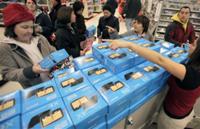WASHINGTON (AP) -- Inch by inch, Americans are recovering some of their vast loss of wealth from the recession, thanks to gains in stock investments and home values.
It's likely to be a long trek.
Net worth -- the value of assets such as homes, bank accounts and investments, minus debts like mortgages and credit cards -- rose 5 percent last quarter, to $53.4 trillion, the Federal Reserve said Thursday. That was the second straight quarterly increase.
Yet even with those gains, Americans' net worth remains far below its revised peak of $64.5 trillion reached before the recession began. That underscores the vast loss of wealth over the past two years. Net worth would need to rise an additional 21 percent just to return to its pre-recession height.
And many analysts don't expect a repeat of the strong second- and third-quarter gains any time soon. That's why Scott Hoyt, senior director of consumer economics at Moody's Economy.com, thinks household wealth won't match its pre-recession peak until about 2012.
"We're clearly moving in the right direction, although we have questions about whether we can get there as quickly as we have in the past couple of quarters," Hoyt said.
Stock investments delivered the biggest boost to net worth in the July-September period. The value of stocks jumped $1.04 trillion, or about 17 percent -- slightly less than the previous quarter's rise.
That increase mirrored the stock market's powerful showing. The Standard & Poor's 500 index, a barometer of the market, rose 15 percent in the third quarter. And it's surged about 60 percent since March.
Still, even with an additional 4 percent gain so far in the fourth quarter, the S&P index is still 32 percent off the peak of October 2007. The recession began in December 2007.
Net worth hit bottom at $48.5 trillion in the first quarter of 2009. That followed three huge quarterly declines: 5 percent in the third quarter of 2008, 10 percent in the fourth quarter and 6 percent in the first quarter of this year.
In coming months, the gains in net worth are expected to slow, along with the broader economic recovery. Credit remains tight. And consumers still aren't spending freely.
Some analysts fear the Fed's policy of cheap lending and the weak dollar are inflating stock market performance and encouraging too much speculation. They say the gains of recent quarters aren't sustainable.
"We will eventually recover the loss in net worth, but it may take three to five years," said Mark Vitner, senior economist for Wells Fargo Securities in Charlotte, N.C.
Real estate was a smaller part of the increase in third-quarter net worth. The value of American households' real estate holdings rose 2 percent, or $348 billion. But analysts expect prices to dip again this winter as foreclosures spread and economic growth remains modest.
Barclays Capital economist Michelle Meyer forecasts an 8 percent drop in prices before they hit bottom next spring. Other analysts expect a drop of 5 to 10 percent.
Americans also are paying off debt at record levels, the Fed said. They reduced mortgages, credit cards and other loans by 2.6 percent in the third quarter and have been cutting household debt levels for a year. That's a healthy sign for personal finances, but a cautionary one for economic growth: Consumers are paring their debt with money they might otherwise be spending.
Economists say they doubt the higher net worth will lead many consumers to spend more, thereby invigorating the economic recovery.
"The psychological effects of the big declines are so fresh that people are still scared -- they don't have faith in the wealth," Hoyt said. "And much of the gains are from stock increases. How many consumers are confident enough that those gains are real and not going to evaporate next week that they're going to go out and spend more?"
Even though stocks remain far below their pre-recession levels, employees who have stayed invested in 401(k) plans and continued to contribute have fared better: Major 401(k) providers say nearly 60 percent of such participants now have more money in their accounts than before the market decline.
A higher net worth has made Michael Robinson a lot more hopeful than when the recession began -- enough to start spending a bit more freely and to plow some of his pay back into the stock market. His investment accounts grew about 10 percent in the second and third quarters.
"I feel more optimistic," said Robinson, 64, a professor of business and economics at Saint Mary's College in Notre Dame, Ind., who hopes to retire in about two years. "I was really worried if I was going to retire when the market was down 50 percent."
Alan Hull of Canton, Mich., doesn't feel any richer. His 401(k) account has recovered some. But his other investments have a long way to go.
"To say that we are wealthier -- that's kind of a misnomer," said Hull, 56, who works in information technology for Ford Motor Co. "But I'm starting to see the light at the end of the tunnel, and I don't feel like it's an oncoming train."
Carpenter reported from Chicago. AP Business Writers Alan Zibel in Washington and Christopher Leonard in St. Louis contributed to this report.

No comments:
Post a Comment